Banquets and Catering Study Guide
1/40
There's no tags or description
Looks like no tags are added yet.
Name | Mastery | Learn | Test | Matching | Spaced |
|---|
No study sessions yet.
41 Terms
What makes up a salad?
Base (leafy greens)
Body (main ingredient; gives identity - usually protein)
Dressing (sauce and seasoning)
Topping (adds visual appeal and flavor)
Garde Manger
“keeper food to be eaten”
cool storage (fridge)
chef/station responsible for preparing cold dishes (salads, hors d’oeuvres, charcuterie, etc:.)
Ratio for vinaigrettes and mayo
3 parts oil to 1 part acid
3:1
Steps of Smoking
1. Selecting the Meat
2. Preparing the Meat
3. Choosing the Wood and Fuel
4. Setting Up the Smoker
5. Smoking the Meat
6. Monitoring the Temperature
7. Resting the Meat
The Purpose of Smoking
Flavor Enhancement – Smoke from wood adds complex, deep flavors to the meat.
1. Tenderization – Low-and-slow cooking breaks down connective tissues for a tender texture.
2. Preservation – Historically, smoking helped preserve meat by reducing moisture and inhibiting bacterial growth.
3. Aesthetic Appeal – Creates a desirable bark (crust) and smoke ring, enhancing presentation.
Smoking requires patience, but the result is a richly flavored, tender dish that highlights the natural qualities of the meat.
Charcutier
makes all the sausage and smoked items
Buffetier
maintains the buffet
Boucher
butchers all meats and poultry except those that are preserved
Poissonnier
responsible for cleaning, prepping, and storing fish and shellfish and creating fish sauces
hors d’oeuvre
creates and prepares all hors d’oeuvres (appetizers)
Canapes vs Hors D’oeuvres
Served as open faced sandwiches (typically cold) vs a general appetizer, like salad boards, or any other items and that may be served hot or cold.
Forcemeat
ground meats that include poultry, fish, shellfish, and sometimes fruits or vegetables
Charcuterie
display of the forcemeats that are smoked, cured, brined, or aged which are made into different shapes and items such as pates, terrines, galantines, and sausages
components of a forcemeat
binder
seasoning
fat
nourishing element
Examples of random garnish
nuts
vegetables (such as truffles)
olives
mushrooms
herbs
random/scattered
What can be an inlay?
Layers of different meats, herbs, or truffles embedded within a terrine for artistic presentation
intent behind it
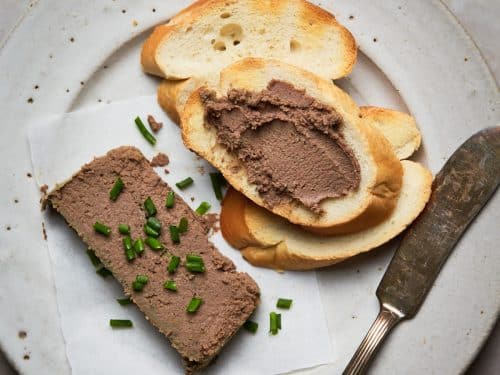
Pate
smooth or coarse forcemeat (french for paste)
baked, in a mold or in pastry (if in pastry, = pate en croute)
325 degrees for 2-3 hours
use a bain-maire for even cooking (final temp depends on protein)
served cold, sliced, with bread/pickles
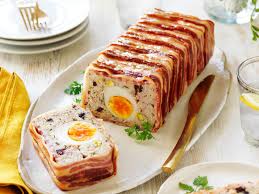
Terrine
smooth or coarse forcemeat
baked in a mold, water bath, bain-marie
325 degrees for 2-3 hours
Check internal temp (160-170)
served cold, sliced, with mustard/garnishes
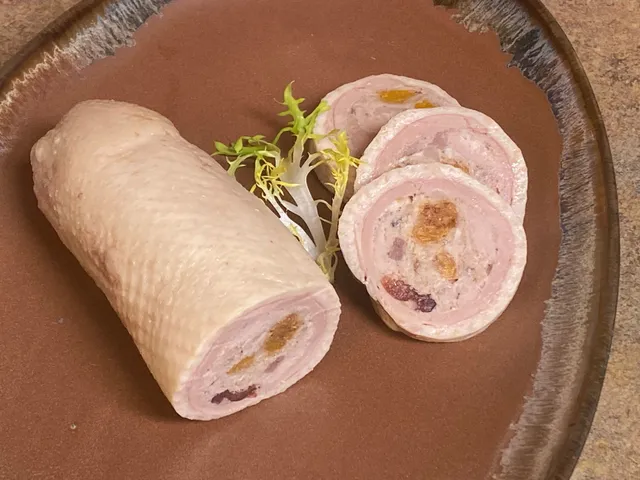
Galantine
made from poultry or fish that has been ground and stuffed. Wrapped in its own SKIN.
stuffed, rolled, and POACHED gently
180 degrees for 2-3 hours
chill after poaching for slicing
served COLD, sliced with aspic
Aspic
a savory jelly made with meat stock, set in a mold and used to contain pieces of meat, seafood, or eggs
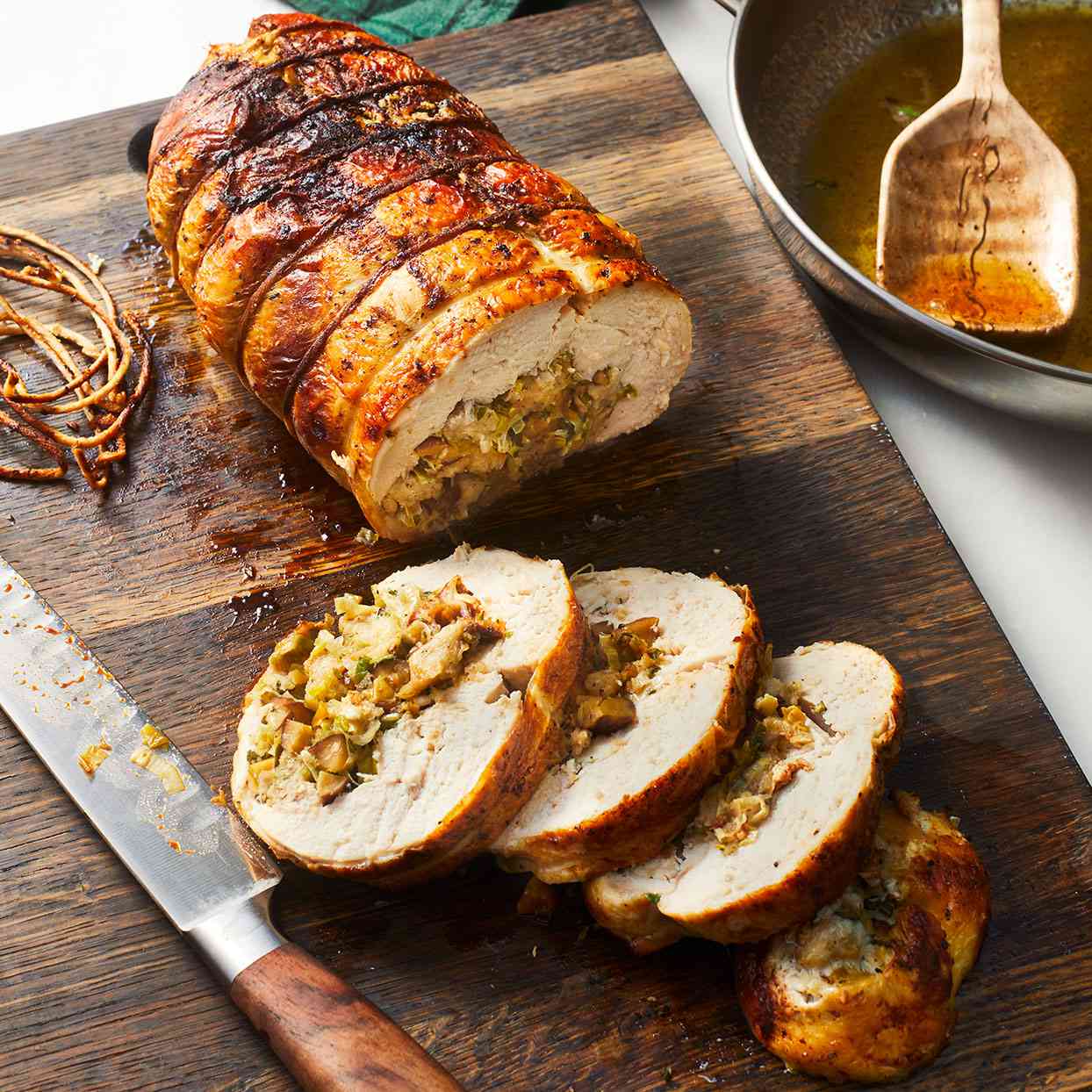
Ballotine
originally a meat item but can also be made form poultry or fish. Tied with butchers TWINE.
stuffed, ROASTED, BRAISED, or STEAMED
350 degrees for 1-1.5 hours
Check internal temp (160-180 degrees)
served HOT OR COLD, sliced
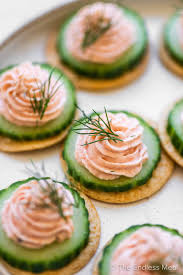
Mousseline
blended with cream, poached or baked
180 degrees for 10-15 minutes
gentle cooking to retain light texture
served warm or chilled, with sauce
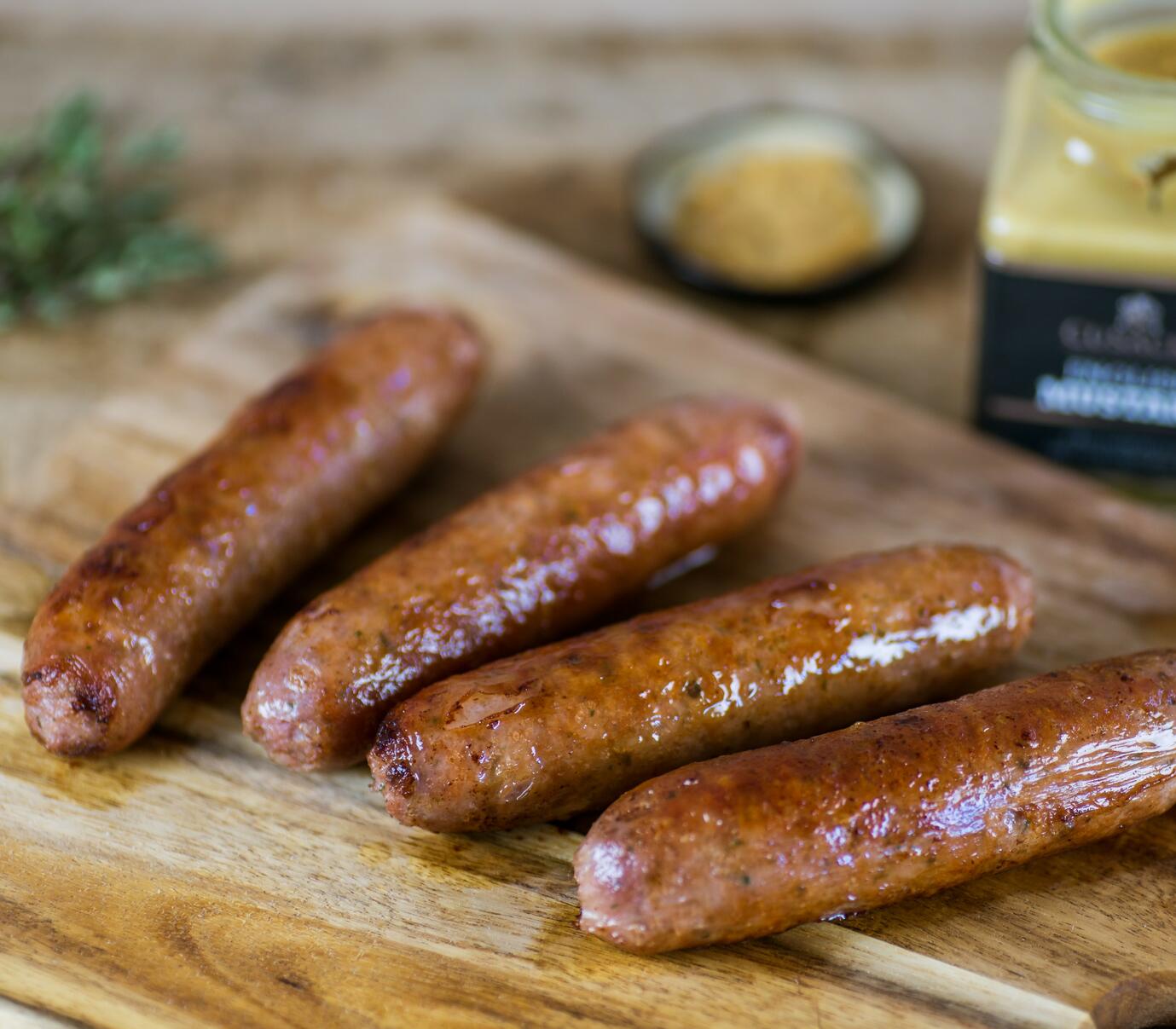
sausages
stuffed, poached, then grilled, smoked or dried
180 degrees for 20-30 minutes
poach first, then grill or smoke
served hot (grilled) or cold (cured)
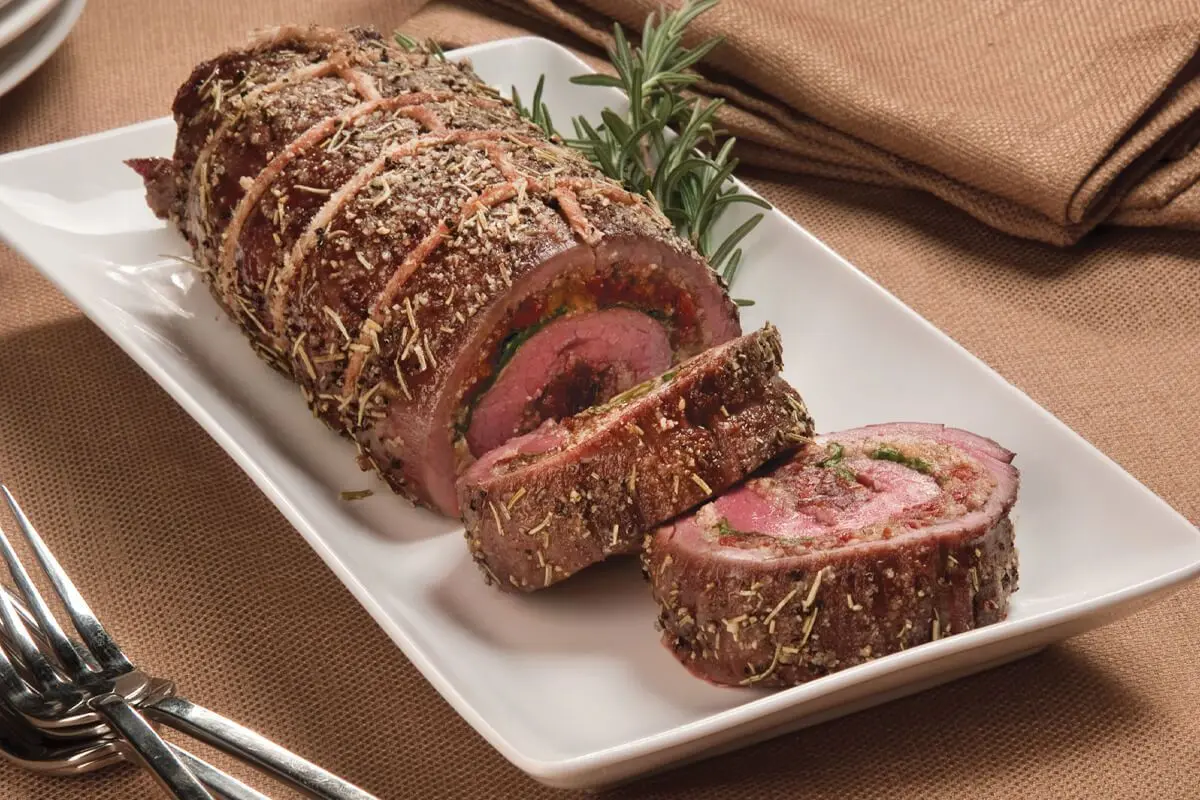
Roulade
rolled and roasted, braised, or poached
350 degrees for 1 hour
secure tightly with twine
served sliced, hot or cold
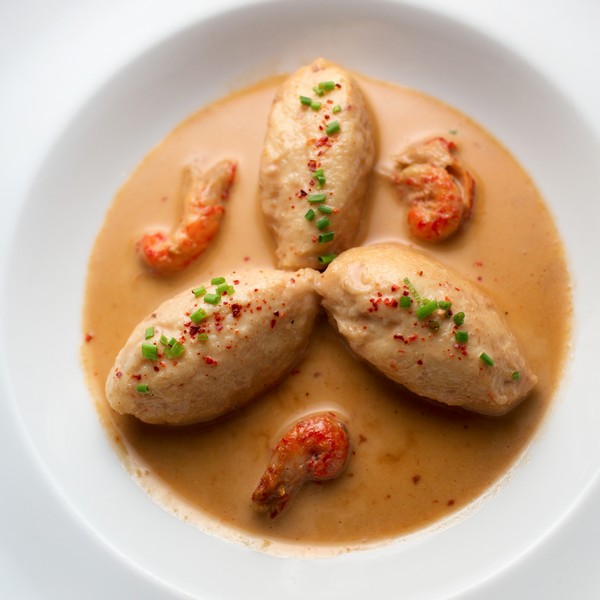
Quenelles
poached, made from mousseline
180 degrees for 10-15 minutes
form and chill before cooking
served hot with sauce
Foie Gras
a delicacy made from the fatty liver of ducks or geese, typically obtained through a process of force-feeding (gavage) to enlarge the liver and increase its fat content
available raw, fresh, semi-cooked pasteurized or preserved
How many canapes per person for an event?
8-10 per hour per guest
fats in forcemeats
gras: fatty with meat
maigre: lean or low fat
25% fat to 75% lean
contribures: flavor, moisture, and smooth texture
Binders
hold protein mixture together by giving it more structure
gives smoother consistency
increases overall yield
ex: egg/eggwhites, panada, aspic, gelatin, blood
Panada
a starch and liquid used to
bind
tenderize
produce
add smooth texture
add moisture
should be neutral in color and flavor
Five Types
**Pain de Mie or Pullman Loaf (bread) - slices of bread soaked in liquid
**Flour - flour, cream, and egg whipped together
Potato - mashed potatoes
Rice - overcooked white rice which is high in sugar and break down easily
Frangipane - flour panada with a small amount of egg yolk
**most often used; react the same**
Dry Cure (salting) - preservation
•Salt is rubbed onto the food product, then the food product is packed in more salt.
•To retard spoilage & inhibit bacterial growth.
reduces amount of water in food
Example:
•Prosciutto (18 months), can be up to (60 months)
•Gravlax - Scandinavian for salmon, salted and sugared, to counteract the salt, a technique the Vikings used
•Salt has played a pivotal role in Human Civilization. Romans for example, were paid with salt, not with coins, which proved a way for survival.
Wet Cures - preservation
Wet cures (brines) A wet cure, or brine, is a dry cure dissolved in water. Brines usually contain sea salt, a sweetener, spices, and herbs.
After brining, rinse the food product, and either cook by boiling, poaching, or baking, or allow the item to mature by drying or smoking.
Pickling - preservation
Pickling is food that has been preserved in a seasoned brine of vinegar mixture.
smoking - NOT preservation (alone)
Smoking alone is not enough to preserve food. Pretreat products to be smoked with a dry cure or brine. Curing will ensure a longer shelf life. (Curing is not necessary for certain processed food products, such as cheese.)
Air Drying - preservation (w/careful monitoring)
may be an important step before and after smoking. It may also replace smoking as a stage in preserving food items. Certain foods take weeks or months to air-dry. Careful monitoring of temperature and humidity is essential to successful and safe air-drying. Mechanical drying, an alternative to natural air drying, offers more precise temperature and humidity control. This is common for fruits and vegetables, such as papaya, figs and tomatoes.
Freezing - preservation
slows the growth of miccroorganisms and enzymatic activities
keeps food safe, extends shelf life, and helps maintain nutritional value and flavor
canning - preservation
uses heat to process food in airtight containers, killing microorganism and preventing spoilage
fermentation - preservation
relies on microorganisms like bacteria and yeast to convert carbs into acids, gases, or alcohol, which inhibit the growth of spoilage organisms and extend products shelf life
beer, wine, sauerkraut, kimchi, cheese
sugaring - preservation
high concentration of sugar draws water out of microbial cells (osmosis), which dehydrates and kills them. inhospitable for microorganisms to spoil food, extends shelf life for foods like fruits, preserves or candied items
BEO
banquet event order
outlines the specifics of an event
master plan/contract between the client and the venue
serves as a communication tool to all departments involved in event (kitchen, service staff, set up crew)
operation guideline (checklist and timeline for staff)
legal/contractural record (binding agreement for what is being delivered and billed
should include:
event details
client info
schedule/timeline
room setup
menu/food and beverage
audio-visual requirements
staffing
additional services (valet, coat check)
pricing and billing
special notes and instructions
approvals (signatures, dates)
Foie Gras Preparation Techniques
Bring the lobes to room temp to make more pliable
separate the two lobes
take the large, Y-shaped vein system using fingers, paper towel or spoon
put in marinade and fridge
SERVING:
Searing
Roasting
In a terrine or mousse